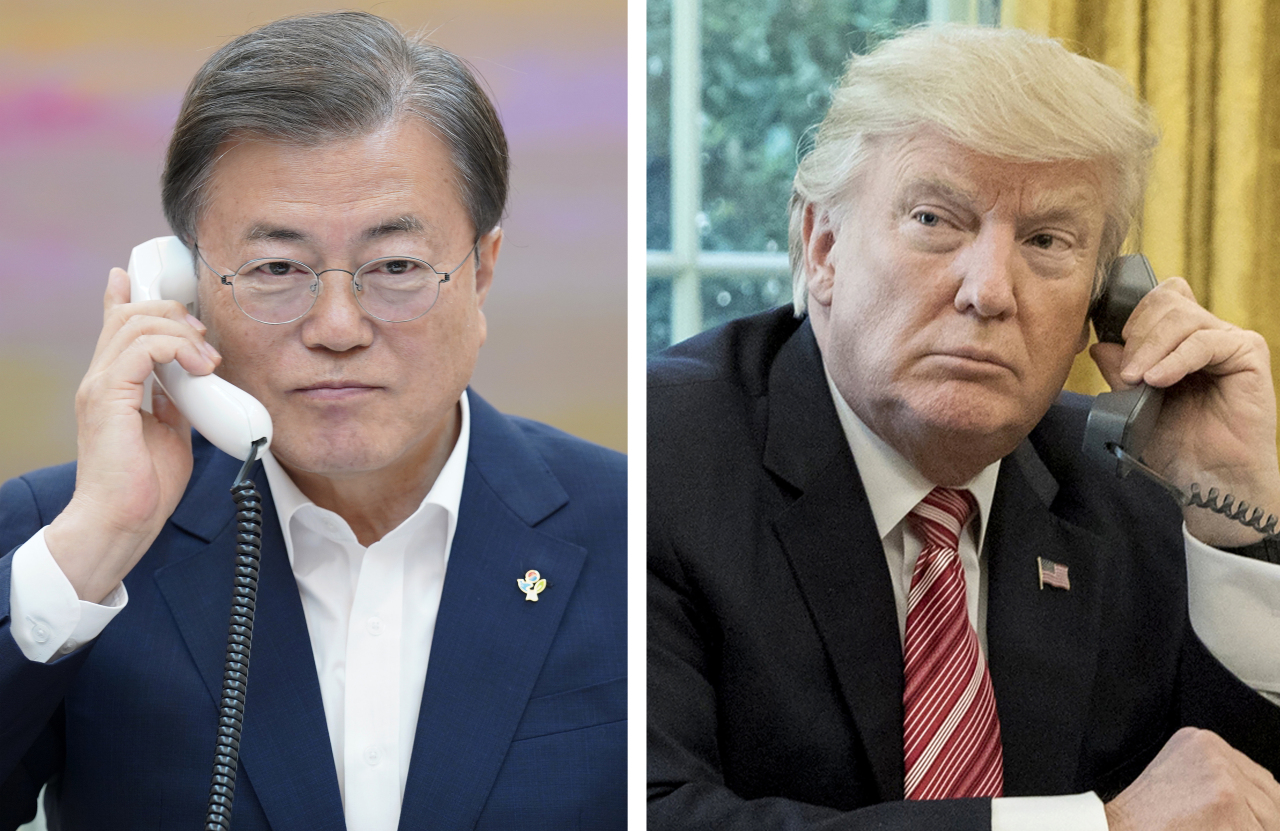 |
President Moon Jae-in and US President Donald Trump. (Cheong Wa Dae) |
South Korea being invited to the G-7 meeting is a step toward a new international order that will raise the country to a new level in international society, Cheong Wa Dae said Tuesday.
“In the words of President Trump, G-7 is outdated, and the possibility of G-7 becoming G-11 or G-12 has grown,” Cheong Wa Dae spokesperson Kang Min-seok said at a press briefing about the previous day’s telephone conversation between President Moon Jae-in and US President Donald Trump.
On Monday, Moon held a telephone conversation with Trump during which the US leader extended the invitation. In inviting Moon, the US leader also outlined his hopes to expand the G-7 meeting to include Australia, India and Russia in addition to South Korea. According to Cheong Wa Dae, Moon said that he will “gladly accept” the invitation, saying he plans to ensure that Korea plays a role in the global economy and the fight against the novel coronavirus. Moon and Trump also agreed on including Brazil in the meeting.
“If President Moon’s visit to the US is realized, it will not be a one-time event as an observer of G-7, but it will mean Korea becoming an official member of a new international system of G-11 or G-12. It means that the country will become one of the leaders that leads international order,” Kang said.
Speaking on condition of anonymity, a high-level Cheong Wa Dae official dismissed concerns about China’s response, saying official opposition from Beijing is not considered likely.
But some observers said amid escalating US-China tensions, Seoul is being pushed to choose between the two.
The US has openly called on Seoul’s aid in its efforts to keep China in check, while Beijing has taken to referring to South Korea-US issues as a US attempt to meddle in Seoul-Beijing relations.
Speaking in an interview with Fox News, US Secretary of State Mike Pompeo included South Korea in a list of countries the US can work with in countering China.
China, for its part, raised its relations with Korea in condemning the recent developments surrounding the US’ Terminal High Altitude Area Defense system in Korea.
Following the US military’s resupplying of the THAAD base in Korea, Chinese Foreign Ministry spokesperson Zhao Lijian reiterated Beijing’s opposition to the THAAD placement in Korea and urged the US not to do “anything that hurts China’s interests and disrupts China-ROK relations,” referring to South Korea by the official Republic of Korea.
In addition to possible friction with China, the G-7 being expanded on a more permanent basis is unlikely to be achieved easily.
The UK has already stated that it will not support a move to bring Russia back into the group. Prime Minister Boris Johnson’s spokesperson has stated that the UK will not back such a move unless Russia “ceases aggressive and destabilizing activity” that threatens the UK and its allies.
In addition, most of the other G-7 nations also have issues with Russia, which was ejected from the G-8 after its 2014 annexation of Crimea, and Russia regaining its membership to the group, or an expanded form of it, would require the support of the current members.
By Choi He-suk (
cheesuk@heraldcorp.com)








![[Today’s K-pop] Blackpink’s Jennie, Lisa invited to Coachella as solo acts](http://res.heraldm.com/phpwas/restmb_idxmake.php?idx=644&simg=/content/image/2024/11/21/20241121050099_0.jpg)